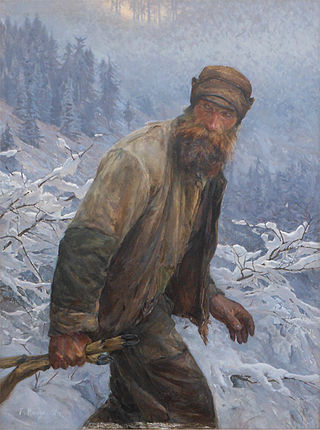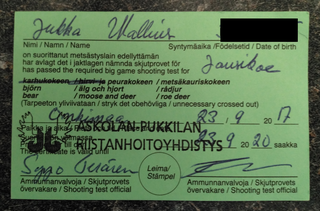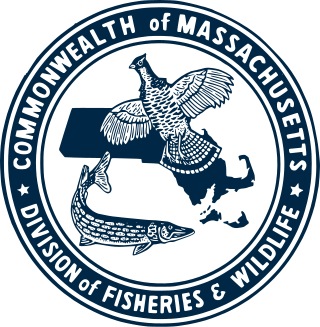
Poaching is the illegal hunting or capturing of wild animals, usually associated with land use rights. Poaching was once performed by impoverished peasants for subsistence purposes and to supplement meager diets. It was set against the hunting privileges of nobility and territorial rulers.
License suspension or revocation traditionally follows conviction for alcohol-impaired or drunk driving. However, under administrative license suspension (ALS) laws, sometimes called administrative license revocation or administrative per se, licenses are confiscated and automatically suspended independent of criminal proceedings whenever a driver either (1) refuses to submit to chemical testing, or (2) submits to testing with results indicating a blood alcohol content of 0.08% or higher.
The Driver License Compact is an agreement between states in the United States of America. The compact is used to exchange data between motorist's home state and a state where the motorist incurred a vehicular violation. Not all states are members, and states respond to the data differently.
The Non-Resident Violator Compact (NRVC) is a United States interstate compact used by 44 states and Washington, D.C. to process traffic citations across state borders.
In the United States, the Driver License Agreement (DLA) is an interstate compact written by the Joint Executive Board of the Driver License Compact (DLC) and the Non-Resident Violator Compact (NRVC) with staff support provided by the American Association of Motor Vehicle Administrators (AAMVA). The DLA requires all states to honor licenses issued by other member states, report traffic convictions to the licensing state, prohibit a member state from confiscating an out-of-state driver's license or jailing an out-of-state driver for a minor violation; and maintain a complete driver's history, including withdrawals and traffic convictions including those committed in non-DLA states.

The Kentucky Department of Fish and Wildlife Resources, an agency of the Kentucky Tourism, Arts and Heritage Cabinet, is responsible for the conservation of wildlife resources and for boating projects in the state. A commissioner appointed by the Fish and Wildlife Commission heads the department. The commission—which oversees the department's commissioner and promulgates regulations governing fishing, hunting, and boating—is a nine-member bipartisan board appointed by the governor from a list of candidates nominated by active hunters and anglers in each of nine geographic districts in the state.

Game laws are statutes which regulate the right to pursue and hunt certain kinds of wild animals and fish. The scope of game laws can include the following:
Many countries have adopted a penalty point or demerit point system under which a person’s driving license is revoked or suspended based on the number of points they’ve accumulated over a specific period of time, points are given for traffic offenses or infringements committed by them in that period. The demerit points schemes of each jurisdiction varies. These demerit schemes are usually in addition to fines or other penalties which may be imposed for a particular offence or infringement, or after a prescribed number of points have been accumulated.
Revocation is the act of recall or annulment. It is the cancelling of an act, the recalling of a grant or privilege, or the making void of some deed previously existing. A temporary revocation of a grant or privilege is called a suspension.

The South Carolina Department of Natural Resources (DNR) is a South Carolina state agency charged with regulating hunting, fishing, boating, duck stamp orders, and the conservation efforts of the state government.
The Oregon Department of Fish and Wildlife (ODFW) is a government agency of the U.S. state of Oregon responsible for programs protecting Oregon fish and wildlife resources and their habitats. The agency operates hatcheries, issues hunting and angling licenses, advises on habitat protection, and sponsors public education programs. Its history dates to the 1878 establishment of the office of Columbia River Fish Warden. Since 1931, enforcement of Oregon's Fish and Game laws has been the responsibility of the Oregon State Police rather than separate wardens.
A bag limit is a law imposed on hunters and fishermen restricting the number of animals within a specific species or group of species they may kill and keep. Size limits and hunting seasons sometimes accompany bag limits which place restrictions on the size of those animals and the time of year during which hunters may legally kill them. Those who violate these laws or other hunting laws are known as poachers.

A hunting license or hunting permit is a regulatory or legal mechanism to control hunting, both commercial and recreational. A license specifically made for recreational hunting is sometimes called a game license.

The North Carolina Wildlife Resources Commission is a state government agency created by the General Assembly in 1947 to conserve and sustain North Carolina's fish and wildlife resources through research, scientific management, wise use, and public input. The Commission is the regulatory agency responsible for the enforcement of NC fishing, hunting, trapping and boating laws.

The Oklahoma Water Resources Board (OWRB) is an agency in the government of Oklahoma under the Governor of Oklahoma. OWRB is responsible for managing and protection the water resources of Oklahoma as well as for planning for the state's long-range water needs. The Board is composed of nine members appointed by the Governor with the consent of the Oklahoma Senate. The Board, in turn, appoints an Executive Director to administer the agency.

The Massachusetts Division of Fisheries and Wildlife, sometimes referred to as MassWildlife, is an agency of the Massachusetts Department of Fish and Game, within the Executive Office of Energy and Environmental Affairs. The Massachusetts Division of Fisheries and Wildlife (DFW) is responsible for the conservation - including restoration, protection and management - of fish and wildlife resources for the benefit and enjoyment of the public. MassWildlife was founded as a state fisheries commission in 1866 in response to citizen concerns about the loss of Atlantic salmon to dams and pollution. The agency's activities are mainly supported by revenue from the sale of hunting, trapping and fishing licenses, stamps and permits; returns from federal taxes on hunting and fishing equipment; various bond initiatives (primarily for land purchase. Additional funding is derived from voluntary donations from businesses, conservation organizations, and individuals.

The Montana Department of Fish, Wildlife and Parks (MFWP) is a government agency in the executive branch state of Montana in the United States with responsibility for protecting sustainable fish, wildlife, and state-owned park resources in Montana for the purpose of providing recreational activities. The agency engages in law enforcement activities to enforce laws and regulations regarding fish, wildlife, and state parks, and encourages safe recreational use of these resources.

Gun laws in Utah regulate the sale, possession, and use of firearms and ammunition in the state of Utah in the United States.

Gun laws in Massachusetts regulate the sale, possession, and use of firearms and ammunition in the Commonwealth of Massachusetts in the United States. These laws are among the most restrictive in the entire country.

A fishing license (US), fishing licence (UK), or fishing permit is an administrative or legal mechanism employed by state and local governments to regulate fishing activities within their administrative areas. Licensing is one type of fisheries management commonly used in Western countries, and may be required for either commercial or recreational fishing.











